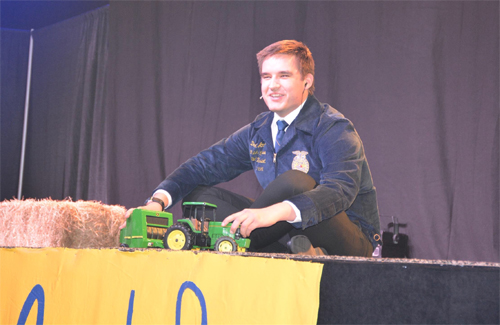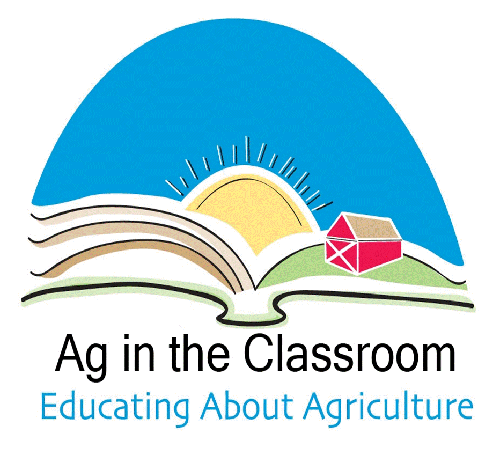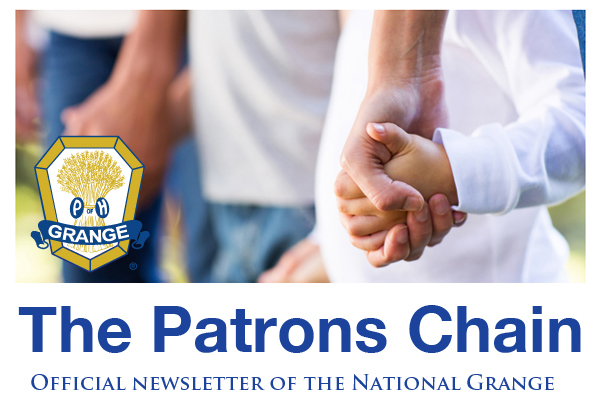The Patrons Chain – July 2016
Farm Safety a MUST
BY BETSY HUBER
National Grange Master | be***@************ge.org
 The recent tragic loss of one of our Junior Grangers, 8 year old George Carter of Massachusetts, in a farming accident, reminded me of how fragile life is and how dangerous farming is—dangerous not only to the farmer, but also to the entire family. George’s death will leave a huge hole in his family as well as in the Massachusetts State Grange. I enjoyed watching George and his sister play next to me during the whole Northeast Regional Leaders’ Conference in January.
The recent tragic loss of one of our Junior Grangers, 8 year old George Carter of Massachusetts, in a farming accident, reminded me of how fragile life is and how dangerous farming is—dangerous not only to the farmer, but also to the entire family. George’s death will leave a huge hole in his family as well as in the Massachusetts State Grange. I enjoyed watching George and his sister play next to me during the whole Northeast Regional Leaders’ Conference in January.
About 1 million children live on farms, according to the U.S. Centers for Disease Control and Prevention, which lists accidents with tractors and other machinery, motor vehicles, and drowning as leading sources of fatal farm injuries to people under age 20. About 84 children die each year in accidents on farms, according to a new study for the American Academy of Pediatrics, and 26,570 are injured. “Agriculture is hazardous,” says Bill Harshman, a senior research associate at the Penn State Extension Agriculture Safety and Health department. “It’s everything we do in agriculture from working with livestock to the pesticides to working in the heat of the day. It’s a pretty broad-based set of safety considerations that we have to concern ourselves with.”
My home is four miles from Lancaster County, PA, the best non-irrigated agricultural land in the U.S. Over the last year there have been a series of farm deaths of young children in Lancaster County. In fact, Lancaster County leads the state in farm fatalities with 50 deaths recorded from 2005 to 2015. These were all terrible accidents, but could they have been prevented?
Here are some facts about farm safety:
Emergency Preparedness– Hospital and emergency medical care are not usually available within a reasonable distance; the farmer and his family do not have the ability or time to deal with an emergency until professional help arrives.
Age of workers– Farm surveys indicate that the injury rate is highest among children age 15 and under and adults more than 65 year of age.
Protective Equipment– It has been estimated that the use of protective equipment, such as roll-over protection and seat belts on tractors, could prevent up to 40% of all farm work injuries.
Equipment and Machinery– The majority of farm accidents and fatalities involve the use of machinery. Proper machine guarding and equipment maintenance in accordance with the manufacturers’ recommendation(s) help in avoiding accidents.
Each year Granges, fire companies, and Cooperative Extension hold Farm Safety Days to emphasize to children and parents the need to be careful on the farm and to separate play areas from farm work areas. These are excellent programs, lots of fun but educational too. A great project for your Grange to work on!
To all the Youth out there, a farm safety display would be a great project to meet the requirements for the William Saunders Agricultural Achievement Award. See www.nationalgrangeyouth.org, Youth Programs, 2016 Youth Program Guide for details.
Have a wonderful summer, be safe out there, and work in your community to improve the safety of others, especially our farmers.
Want to Influence Our Government? Register and Vote!
BY BURTON ELLER
National Grange Legislative Director | be****@************ge.org
 Freedom is not free and a democracy doesn’t just happen. They must be won, nurtured, shepherded and preserved. Freedom and democracy are action terms not passive philosophies. They are much like an athlete’s muscles and conditioning: use them or lose them.
Freedom is not free and a democracy doesn’t just happen. They must be won, nurtured, shepherded and preserved. Freedom and democracy are action terms not passive philosophies. They are much like an athlete’s muscles and conditioning: use them or lose them.
In America’s representative government, we believe ordinary fellow citizens are the best candidates to write the laws and oversee the regulations by which we will all be governed.
As school children, we probably memorized a famous quote by Abraham Lincoln, “Democracy is the government of the people, by the people, for the people.” Every citizen has not only the legal right but the civic responsibility to actively engage in governance at the local, state and national level.
Step one in our engagement with self-governance is to register to vote and then actually vote. If we don’t vote, we’re not heard. Why would anyone not vote? Well, here are reasons commonly given for not voting:
- “I don’t like the choices.” No candidate is perfect. Maybe we’re not enamored with any of the candidates. We may be faced with voting for the better of the two. Not voting at all is like casting a vote for the other candidate.
- “My vote doesn’t count.” We assume everyone else will vote our convictions. Not true. If enough like-minded citizens vote, they will make the difference.
- “It’s inconvenient.” It will be even more inconvenient to live with the laws, regulations and governance we don’t like.
- “I’m tired of the whole system.” Yes, we’ve had enough of the blatant barrage from news feeds, social media, ads, fliers, billboards and experts’ pontifications. Yet that’s no excuse to let others make important decisions on our behalf.
Let’s stand up and honor our Grange founders and their dedication to a better nation and engaged citizenry. Register. Vote.
Trademark Tips
BY DARLENE TZOU
National Grange Trademark Manager | tr*******@************ge.org
 Trademarks are used as a designation for the source of goods or services, and the National Grange has used its GRANGE marks for many years. Despite the long use of our marks, under United States trademark law, the National Grange, as a trademark owner, needs to take steps to police the use of our marks as well as enforce our rights against their misuse to protect the goodwill within our marks.
Trademarks are used as a designation for the source of goods or services, and the National Grange has used its GRANGE marks for many years. Despite the long use of our marks, under United States trademark law, the National Grange, as a trademark owner, needs to take steps to police the use of our marks as well as enforce our rights against their misuse to protect the goodwill within our marks.
As per the goal of trademark law, we want to prevent others from using our marks or similar marks that would deceive or confuse consumers into falsely believing that the National Grange is affiliated with or endorses the services or goods associated with those marks.
In determining whether or not there may be confusion, some factors that one may consider is the visual and/or phonetic similarity of the marks, the similarity in goods and services offered under the marks, the channels of trade and target audiences to which the marks are directed, and any instances of actual confusion. As a Grange member, you can help us protect our rights in our marks.
Generally, some steps that you can take are to ensure that our mark is used as a proper adjective to modify a generic noun and it is never used as a verb or noun itself, and if you find any marks that you believe may be a misuse of our mark, please email tr*******@************ge.org.
We need to ensure that our marks are continually being used as a source indicator of our organization, are used in a manner under our control, and are not used in a manner that may harm the reputation of our organization.
We appreciate all the help from Grange members who have brought to our attention various uses of our marks, and ask for your continued help in policing our marks throughout the United States.
All About the Family
BY JOE STEFENONI
National Grange Membership/Leadership Director | me********@************ge.org
 On May 17, 2016 history was made when Lillian Booth, National Junior Grange Director and I presented the Charter to High Desert Junior Grange #1 in Fallon, Nevada. A special meeting was held to present the Charter and there was an air of enthusiasm and excitement about the occasion. For perspective, High Desert Grange was organized on June 27, 2015 with 46 charter members and now less than a year later they have organized the first Junior Grange in the State of Nevada with 39 charter members.
On May 17, 2016 history was made when Lillian Booth, National Junior Grange Director and I presented the Charter to High Desert Junior Grange #1 in Fallon, Nevada. A special meeting was held to present the Charter and there was an air of enthusiasm and excitement about the occasion. For perspective, High Desert Grange was organized on June 27, 2015 with 46 charter members and now less than a year later they have organized the first Junior Grange in the State of Nevada with 39 charter members.
The highlight of the evening was having the opportunity to speak with some of these new Junior Grange members and hear about what they love most about being a part of both High Desert Grange and High Desert Junior Grange. One of the central projects for this Junior Grange in the Grange Fair Program and all of the new Junior members I had the opportunity to talk with shared their excitement about having the opportunity to learn animal husbandry, exhibiting their projects at jackpot shows and building friendships through their time raising the animals. However, the most common answer among the Juniors I spoke with was that their whole family can participate in Grange activities. They appreciate that they can participate in Grange activities alongside their parents and siblings as opposed to other youth organizations which they could join.
This feeling is the same among their parents who are also members of the High Desert Grange. The Junior Grange is giving the kids opportunities that they aren’t getting through school or other youth activities. In Junior Grange they have a place where the kids can learn about leadership, personal responsibility, exploring different opportunities and making friends. Junior Leader Gloria Montero said that the Junior Grange is allows its members to have a voice and express their opinions while working towards a common goal. In additions to the livestock projects, High Desert Junior Grange also has LEGGO® robotics, sewing, cooking and soap making. In early May, High Desert Grange coordinated and sponsored a jackpot show for youth to exhibit their livestock. Sister Montero said that this was a way to bring business to their community and for the Junior Grangers to be exposed to the business side of raising livestock.
Junior Master Emma Parsons and her sister Aurora are both excited to be making this first step in their Grange journeys. Emma said that the Junior Grange is giving her the opportunity to build her leadership skills, public speaking skills and learn parliamentary procedure. She plans to participate in various community service projects. Emma said that to her Junior Grange is the “complete package”. Aurora said that she looks forward to bringing more members into the Grange.
The first Granges in Nevada were established in 1873 under the jurisdiction of the California State Grange. Currently there are four Community Granges and one Junior Grange spread across the state. If you or someone you know would like more information on joining or starting a Grange in Nevada, contact National Grange Leadership/Membership Development Director Joseph Stefenoni at me********@************ge.org.
Tradition!
BY JOE STEFENONI
National Grange Membership/Leadership Director | me********@************ge.org

Recently, I visited my high school to enjoy their production of Fiddler on the Roof, the classic story of Tevye and his family. As I sat in my seat listening to the opening tones and lyrics of Tradition one line spoken by Tevye truly stuck with me. “Here in Anatevka, we have traditions for everything; how to sleep, how to eat, how to work, how to wear clothes… You may ask, how did this tradition get started? I’ll tell you, I don’t know, but it’s a tradition!”
As the story goes on, Tevye must come to terms with the changing world around him. To do this, he must learn how to balance the old traditions of his faith with the world he lives in, and by the end of the story, Tevye has learned how to celebrate traditions while at the same time adapting to the world around him. Immediately, my mind went straight to the Grange with our numerous rich traditions. Our traditions that have stood the test of time, but how do our traditions play a part in the recruitment and retention of new members? Is it possible that we can strike a balance between our traditions with the need to remain relevant to our members and our community? I say, “ABSOLUTELY”!
When we look at the identity of our organization, it’s necessary to remember that at the end of the day we are a fraternal organization and it is our ritual and fraternal bonds that are the foundation of what binds us together throughout the nation. At times, we shy away from our traditions either because we feel they don’t fit with society or we don’t understand why we do what we do. How often have we heard a member ask why something in the ritual is done the way it is and the answer they receive is “because we’ve always done it that way”. This is almost the same as Tevye exclaiming “…it’s tradition!” Wouldn’t it better serve our members and ourselves to take the time to understand and explain the history and meaning behind our traditions?
Much of our ritual dates back almost 150 year to the founding of the Grange and as such may not be quickly understood by someone who is new to the Grange. Ritualism is something that was commonplace to those of my Grandparents generation who were involved in many different organizations from Masons to the Royal Neighbors who each had their own unique ritual. However, ritualism isn’t as common today as it was a century ago. When we bring new members into our Grange, we must ensure that our rituals and traditions are fully explained to them. Place yourself in the shoes of a new member who is observing our ritual for the first time. It could be unusual to see certain aspects without an experienced member to answer questions that a new member may have.
Our traditions can also be a tool by which to both recruit and retain members. We should not be afraid to share our traditions should be shared with new members upon joining the Grange and we should also be sure to refresh the collective memory of our current members. Our traditions are rich and meaningful and there are many people who are looking for a return to the more traditional and basic values that our rituals and traditions espouse.
For those of us who have been Grange members for a number of years, our traditions seem to be natural and second nature to us and we may have become complacent with them. It is of the utmost importance to take pride in our traditions and fully understand what we do and why we do it. It is then that we will be able to share our traditions with and excite new members about the history, ritualism and traditions of the Grange. So let’s pull out the manuals, the stations, the regalia and unwritten work. Blow the dust off and practice the floor work once again. As we do this, let us take the time to understand the meaning behind these traditions and strengthen our fraternal bonds.
GROW Club Banquet Keynote Speaker
BY CHARLENE SHUPP ESPENSHADE
National Grange Youth Director | yo***@************ge.org
 I am pleased to announce that Alan Bjerga of Bloomberg will be the keynote speaker at the GROW Club dinner at the 2016 National Grange Session.
I am pleased to announce that Alan Bjerga of Bloomberg will be the keynote speaker at the GROW Club dinner at the 2016 National Grange Session.
Alan Bjerga is the author of the book Endless Appetites and co-host of “Politics, Policy and Power,” a public-affairs program on Bloomberg Radio. He covers global food policy for Bloomberg News and is a journalism instructor at Georgetown University. He is a past president of the National Press Club and the North American Agricultural Journalists as well as the recipient of numerous journalism awards. His commentary on food and agriculture issues has appeared on Bloomberg Television, National Public Radio, the BBC and PBS Newshour, among other outlets. Bjerga grew up on a farm near Motley, Minnesota, population 671.
I have known Alan for several years thanks to my membership at NAAJ. He is a lot of fun as well as a great speaker. He has spoken at several TED talks. With the growth of agriculture issues, he has a fun and unique way to look at why agriculture is important. Plus, for many of our young people, I thought he would be a great motivational speaker for those thinking “they might be too young” to achieve great things.
National Grange Recognizes Louisiana Educator as 2016 Ag Advocate
BY CHRIS SZKUTAK
2014 DCI Communications Fellow

PHOENIX – When Denise Hymel donated two-and-a-half acres of her Louisiana sugarcane farm in 1999 to a nonprofit she founded to educate students and adults alike about agriculture and food, she may never have expected the accolades to come.
But it is just that type of volunteer educator the National Grange and National Agriculture in the Classroom Organization (NAITCO) were looking for in their 2016 Ag Advocate of the Year award winner.
On Wednesday, June 22, the organizations proudly honored Hymel in one of the most special moments of the annual NAITCO Conference, held in Phoenix.
Hymel, a long-time Louisiana Farm Bureau and Agriculture in the Classroom volunteer, has helped educate more than 75,000 students at her “Fast Food Farm.” Children have learned about the production of vegetables and livestock first-hand.
Hymel has been at the helm from the beginning and hosts annual tours for fourth graders, provides a garden lab for nearby agri-science classes and provides meeting and event space for community groups such as FFA, 4-H, AITC, the Soil and Water Conservation District, Girl Scouts and Boy Scouts.
National Grange President Betsy Huber praised Hymel’s focus on education and volunteer spirit.
“The Grange was founded in 1867 to educate and connect the American farmer and family. In today’s world it is even more important to educate Americans about the necessity and importance of agriculture in their lives,” said Huber. “The Grange is proud to sponsor the Ag Advocate Award annually to recognize volunteers who serve others through education, which is the heart and soul of our organization.”
“National Agriculture in the Classroom and its state Agriculture in the Classroom programs depend on hard-working, dedicated volunteers like Denise Hymel,” said Lorri Brenneman, President of NAITCO. “So it is with pleasure we honor Denise who goes above and beyond the call of duty to educate youth about the importance of our industry.”
Hymel grew up on a farm in a rural area in Louisiana along the Mississippi River, and participated in 4-H beginning at a young age. In the late 1990s, she spent two years developing what would become the Fast Food Farm. In addition to donating the land, she created the non-profit organization that would govern the operation. She serves as its unpaid executive director, and answers to a 12-member board of directors composed of teachers and community leaders.
Fast Food Farm grows potatoes, corn, tomatoes, cucumbers, onions, wheat and raises chickens, pigs, dairy and beef cattle. The goals of the farm are to educate consumers about how their food is grown; create innovative educational materials for K-12 teachers and students; provide mentoring opportunities for students; and provide leadership opportunities for 4-H, FFA and Pro-Start students.
National Grange Welcomes Derek Anderson as Summer Intern
BY DEREK ANDERSON
National Grange Intern | in****@************ge.org
 This summer interning at the National Grange office is Tennessee native, Derek Anderson. Anderson is currently a student at the University of Tennessee at Martin where he majors in Agriculture Education. After school Derek hopes to pursue a career in the agriculture field. Anderson grew up on a small commercial beef farm in Manchester, Tennessee with his parents Laura and Tommy Anderson. An active FFA member and 4-H’er, Anderson recently retired from serving the Tennessee FFA Association as a State Officer. Using skills learned, Anderson is working with The National Grange legislative staff this summer to learn about the Grange, its fraternal roots, and to work on policy and relations in the capitol.
This summer interning at the National Grange office is Tennessee native, Derek Anderson. Anderson is currently a student at the University of Tennessee at Martin where he majors in Agriculture Education. After school Derek hopes to pursue a career in the agriculture field. Anderson grew up on a small commercial beef farm in Manchester, Tennessee with his parents Laura and Tommy Anderson. An active FFA member and 4-H’er, Anderson recently retired from serving the Tennessee FFA Association as a State Officer. Using skills learned, Anderson is working with The National Grange legislative staff this summer to learn about the Grange, its fraternal roots, and to work on policy and relations in the capitol.
National Grange as Ag in the Classroom Coordinator for District of Columbia
BY AMANDA LEIGH BROZANA
National Grange Communications Director | co************@************ge.org
 On Tuesday, July 5, the National Grange became the “state coordinator” for Agriculture in the Classroom in the District of Columbia.
On Tuesday, July 5, the National Grange became the “state coordinator” for Agriculture in the Classroom in the District of Columbia.
The partnership will connect the National Grange with the Ag in the Classroom organization in a way familiar to many State Granges who assist with the program in their areas.
It also allows the nation’s oldest agriculture advocacy organization a chance to make a rural-urban partnership, bridging the gap by promoting agriculture literacy.
“We are excited to have the opportunity to be the state coordinator for the District of Columbia,” National Grange President Betsy Huber said. “To bring agriculture education to the students and parents of the nation’s capital allows us to connect those far removed from the farm and field.”
Huber said the program will be housed under the National Lecturer’s department. Each Grange at all levels has an elected Lecturer who serves as the educational and programs coordinator.
“This is why it makes sense to be a program under the National Lecturer’s department – because so many voices from Grangers across the country will be instrumental in assisting with our involvement and program selection for the D.C. Ag in the Classroom, making it a truly national program,” Huber said.
Katie Bigness, New York AITC coordinator, said many states in the Eastern Region “have a strong Grange partnership or presence in our programs,” and noted the diversity in structure, funding and programming across the states.
National Grange Lecturer Amanda Brozana said she also plans to work closely with Potomac Grange No. 1, the only Grange in Washington, D.C., to develop and distribute appropriate programming to the children of the District.
George Mayo, former president of National Agriculture in the Classroom and Maryland Agriculture in the Classroom coordinator, welcomed the National Grange.
“We also appreciate the Grange and their support of AITC nationally and locally,” Mayo said.
National Grange Partners with Monroe Classic
BY LORETTA WASHINGTON
National Grange Marketing and Sales Coordinator | sa***@************ge.org
 The Grange is happy to announce the launch of a partnership with Monroe Classic, creating the New Grange Store @ Monroe Classic as the home for all your official Grange apparel and logo’d merchandise. Most items previously available at the Grange Store are available through the New Grange Store @ Monroe Classic and new items will be added often. The newest item is a Grange Cap (item #862), embroidered with the Grange emblem, on a blue or khaki cap. Show your support and pride by wearing your Grange Cap or other Grange apparel at fairs, shows and other events this summer. Order yours today at http://www.promoplace.com/grange/wearables.htm.
The Grange is happy to announce the launch of a partnership with Monroe Classic, creating the New Grange Store @ Monroe Classic as the home for all your official Grange apparel and logo’d merchandise. Most items previously available at the Grange Store are available through the New Grange Store @ Monroe Classic and new items will be added often. The newest item is a Grange Cap (item #862), embroidered with the Grange emblem, on a blue or khaki cap. Show your support and pride by wearing your Grange Cap or other Grange apparel at fairs, shows and other events this summer. Order yours today at http://www.promoplace.com/grange/wearables.htm.
We are always open to ideas and suggestions for new merchandise. Please contact Loretta Washington at sa***@************ge.org or by phone at 202-628-3507.
The National Grange will continue to provide Grange supplies such as record books, decals, leadership supplies, awards, gavels, brochures and more. See the Supply Store @ National Grange to check out the inventory and restock your Grange supplies today. Go to www.grangestore.org.

